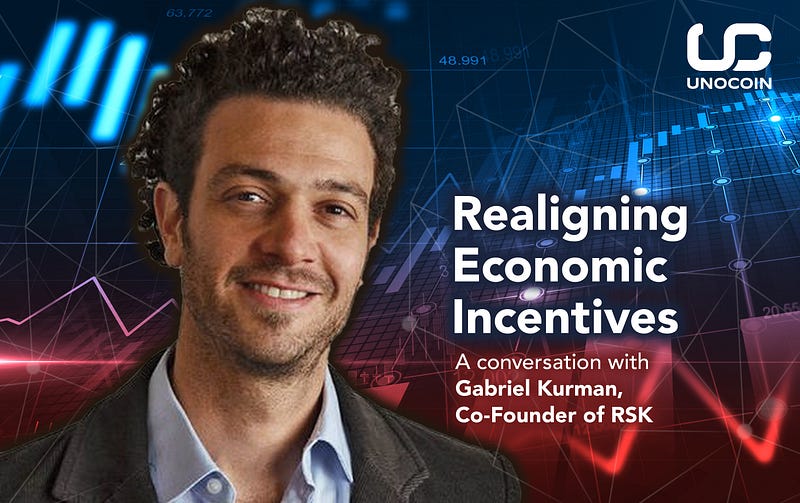Sunny Ray, President at Unocoin engaged Gabriel Kurman, co-founder of RSK in an important discussion on the genesis of cryptocurrency and its widespread adoption.

For over a month now, President at Unocoin, Sunny Ray, has been hosting engaging and insightful conversations with leading figures in the cryptocurrency space on his channel Bitcoin Stories. The show has now developed into a series of episodes, each bringing out different perspectives and finding common threads in why millions around the world continue to challenge the status quo and look to cryptocurrency.
This week, in discussion with Ray was Gabriel Kurman from Argentina, economist and cofounder of RSK. RSK is the first open source smart contract platform that is powered by the bitcoin network. RSK’s goal is to add value and functionality to the bitcoin ecosystem by enabling smart-contracts, near instant payments, and higher-scalability.
Gabriel told the audience that he originally came from a middle class family in Argentina, a country known for its string of economic crises. “The financial crisis is somewhat embedded in the Argentine DNA,” he said.
“We are always expecting something going wrong in the financial system. Every family has stories of people losing their homes because of hyper-inflation, or because they took a loan, or they were taking money out of the bank and got robbed. All these crazy stories are super common in Argentina.”
Kurman wasn’t sure of what to study in high school, and so he decided to study economics. “My parents thought it was something that could help me understand how the world works and recognise what my passions further along the road,” he said.
When it came to looking for a job, like many Argentines, he was trying to find a path to get a salary in US dollars, instead of the Argentine Peso. “This is something that is embedded in every Argentine — we understand that we can’t save in the local currency; it devalues all the time.”
His professional history that followed with multinationals, corporate finance companies and then in private equity led to Kurman witnessing the 2008 crisis from London, which was “an interesting way to see the crisis”. He learnt about Bitcoin in 2013 and participated in the first meet-up in Latin America — he didn’t know what to expect, and that’s perhaps why it had a profound effect on him.
“My mind was exploding with ideas after the conference and it has been a wild ride ever since then. But I finally understood that there was something wrong in the financial system and I started to see the solution. Shortly after the Bitcoin meet-up, I, as an individual, was trying to buy my first house.” Kurman was coincidentally also heading an acquisition in his company then.
“I went to the bank to make a mortgage and the conditions I was being offered were completely different and much worse than the ones we were given as an organisation to acquire a $100m company. That’s when I realised for the first time why there is so much inequality in the world and why this (Bitcoin) will eventually lead to change.”
Frustration with the existing system:
“The problem is that the system is wrongly programmed — the economic incentives of the system we live in drive us to a polarisation in equity and wealth. It is much easier to make a lot of money when you have a lot of money. This was very frustrating to me — it doesn’t matter what or how much you do, the system is built to sink. I myself as an individual was getting a much higher interest rate and a very small benefit of the asset that I am trying to buy. But the leverage that a corporation gets is much higher than a small guy would get to buy a home.
“This applied to everything — in Argentina, the pensioners, firemen or policemen can get loans easily and at no risk, because the ones providing the loans collect the return directly from their paychecks. And yet they pay incredibly high interest rates for the loans. All this because there is no competition — they have to accept that or nothing.”
“I then started dreaming of starting to build on the financial system where the rules are redesigned to create economic incentives to promote decentralisation, so that the small guy gets better and fairer conditions than big corporations. We need to balance the economics of scale and I saw the potential of doing that with blockchain or Bitcoin; the possibility of building a portfolio where billions of small loans can be distributed across Africa and Latin American, based on a portfolio that could be more diversified, have lower risk of default and hence try giving lower interest rates to those small guys. We need to challenge the concentration of capital in a few hands that late-stage capitalism has created.”
The two speakers then spoke about how Bitcoin and the blockchain offered an elegant solution to realign economic incentives bent in favour of corporations. To follow the rest, watch the full conversation here: https://www.youtube.com/watch?v=XG9s4rO1mW0&t=4016s



